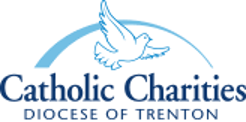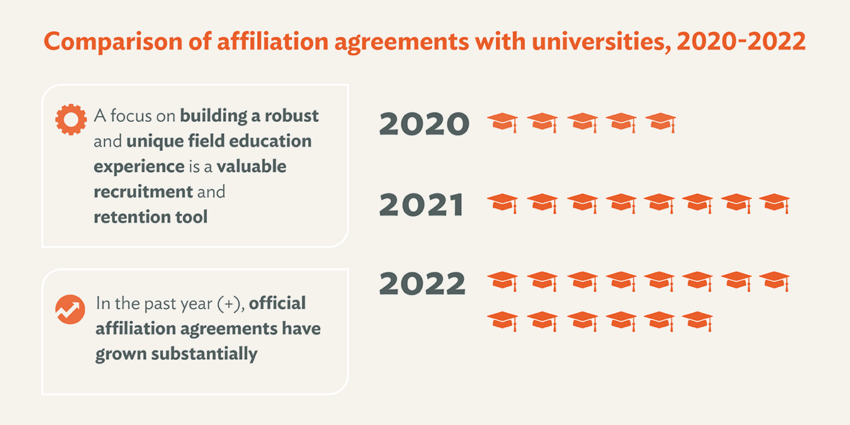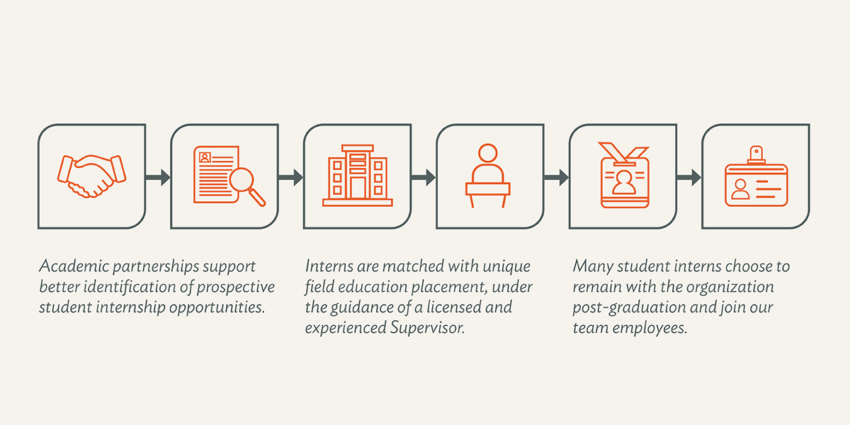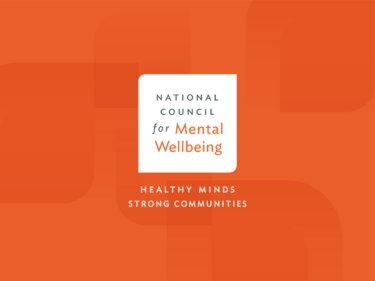
Like many nonprofit and health care organizations, the COVID-19 pandemic continues to have an indelible impact on mental health and substance use treatment services and organizations. Many community-based organizations have struggled to recruit and retain staff due to increased workloads, a desire for remote work opportunities and economic uncertainty. At the same time, many employees and potential candidates have chosen to return to school to reevaluate, change or improve their employment opportunities.
One strategy that mental health and substance use treatment services organizations can utilize to address recruitment and retention challenges is to leverage the influx of students and student interns in the academic environment. Field education, or internships, support a mutually beneficial environment where the student and the employer gain valuable skills, experience and create a setting for potential recruitment and professional growth. Internships can bridge the gap between recruitment and retention by providing students the opportunity to work in an organization, supporting career development and providing valuable exposure to the field.
Catholic Charities, Diocese of Trenton is a nonprofit agency that offers mental health, poverty-reduction and social and crisis services to individuals and families, particularly those impacted by trauma and adversity. Catholic Charities utilizes an integrated health care model, delivering whole health care to individuals and families in need. The mission of Catholic Charities is to restore dignity and independence to individuals and families, especially those who are most vulnerable. Our organization serves more than 10,000 consumers in the community, through nearly 60 programs across four counties, including Mercer, Monmouth, Burlington and Ocean County in New Jersey.
Catholic Charities Field Education Program
As a participating organization in the Center of Excellence for Integrated Health Solutions (CoE-IHS) Workforce Innovations in Integrated Care Learning Collaborative, Catholic Charities received support to mitigate several workforce challenges associated with recruitment and retention. Through this initiative, Catholic Charities’ Field Education Program was developed to improve recruitment and retention strategies through strong academic partnerships and robust field education internship opportunities for students. A focus on developing and maintaining community partnerships with local academic institutions and internship programs allowed Catholic Charities to enhance and diversify a new recruitment pool to identify strong candidates, while also providing interns with hands-on health care experience.
Accomplishments to Date
Since the launch of the Field Education Program, Catholic Charities has renewed relationships with existing universities and colleges, driven development of new academic partnerships, revitalized internship learning opportunities and revived in-house field education standards. By reinforcing the importance of regular communication and engagement with our existing field liaisons, our academic partnerships became much more meaningful and mutually beneficial. We recently developed new academic partnerships with more than a dozen institutions, while also offering cultural competence training and supervision to enrich the integrated health care experiences available to field education participants and improve the care provided within our organization.
The Field Education Programs include experiences in various locations, unique learning opportunities and clinical supervisors that support a unique and individualized internship experience for students. Supervision by an experienced, licensed professional supports academic requirements for internship instruction as it supports our recruitment efforts, as many students choose to stay on with the agency after graduation in an employed position while they seek post-graduate licensure.
We have revitalized our internship learning opportunities to include topics relevant to the community that we serve, including human trafficking training, racial biases and health inequity webinars, as well as other diversity, equity and inclusion (DEI) related trainings, accessible to all interns involved. Supporting and providing DEI related training has contributed to our staff’s understanding of health inequity, cultural competence and providing care through a lens of cultural humility. Offering these trainings supports our health care professionals with guidance, tools and knowledge that will effectively support an inclusive and welcoming environment for the community that we serve.

Sustainability
We plan to continue our efforts and work together with our partners to provide valuable experiences to students and to the community we serve. Academic partnerships have been instrumental in growing our new pool of recruits and have had a positive impact on our staff by supporting retention rates and overall morale. These collaborative partnerships have also created a valuable resource for accessing tools that support workforce development. In addition to training and webinars, often provided free of charge to our staff, many universities have invited our supervisors to participate in management training to better support student interns and field education. We will review potential funding opportunities and sources to further strengthen our Field Education Program, while prioritizing sustainability to continue our program partnerships, especially as it relates to remote and in-community learning opportunities. We have also discussed developing an alumni database that can be used to maintain professional communication with those who may be interested in recruitment opportunities. We plan to continue our collaboration with more than a dozen academic institutions and identify additional opportunities to build new and engaging partnerships in the community.

Lessons Learned
Supporting academic partnerships as a way to address workforce needs is an innovative way to create opportunities for future professionals, while also addressing the immediate needs of an organization. Examining existing recruitment and retention practices to encourage greater cultural competence and opportunities for new professionals, in conjunction with the goals of academic partners, has also led to improved training opportunities for interns and staff.
In total, more than a dozen universities partnered with Catholic Charities to support recruitment and retention efforts agency-wide, while also contributing Field Education Program and other improved educational opportunities for student interns and staff.
Main Takeaways
By developing robust and supportive academic partnerships, Catholic Charities and other nonprofit organizations can access a talented, diverse and motivated workforce, while providing graduate level students with valuable experiences in the health care field. Our partnerships have led to unique field education opportunities for students and a greater volume and diversity in our recruitment candidacy pool. Overall, these efforts contribute to improvements in morale and feedback from our staff, ultimately improving workforce retention and culture within our organization. We look forward to continuing our partnerships in the community, while making a positive difference for our current and future staff.
Guest Author
Director of Clinical and Integrated Health
Catholic Charities, Diocese of Trenton



